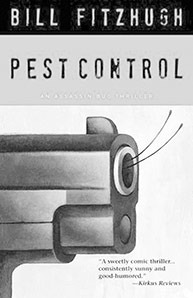Reading Between The Lines: A hilarious book about a deadly case of mistaken identity

Pest Control will NOT make you think or consider philosophical points or think differently about life, and never comes near being poignant or deep. So why read it? Because it's pretty damn entertaining.
Pest Control is through-and-through a screwball comedy, a comedy of errors, and a parody of New York City rolled into one tight “snug-as-a-bug-in-a-rug” book (I have a pun quota). The book is shamelessly full of classic character archetypes and stereotypes — down-on-their-luck but well-meaning dreamers, hitmen with calling cards, killers with a conscience, sleazy slum lords, Mafia dons, femme fatales — and the author knows how to make use of them successfully and hilariously.
Enter Bob Dillion (no relation to Mr. Tamborine Man himself), a down-on-his-luck entomologist-turned- bug-exterminator from New York, New York, with high-flying dreams of starting his own “all-natural” pest control business: breeding bugs to hunt other bugs. Bob is earnest, well-meaning, hard-working, and, as is typical, has gotten nowhere ahead in life. Drunk on a particularly bad day, he answers an ad in a newspaper asking for an exterminator, promising an exorbitant reward, that, unbeknownst to him, is actually a request for an assassin from a bumbling French middleman. Of course, the story being one of comedic error, the target dies, not through an assassination, but in a case of impaired driving.
Bob Dillion, husband and loving father of one, is suddenly the world's deadliest assassin, and he doesn't even know it.
This sudden development, of course, makes a lot of (dangerous) people unhappy or excited to see a new player in the field. Be it the various top assassins of the world (some of whom include, but aren't limited to, cross-dressing midgets, and lanky Nigerians), seeking out to snuff new competition; bumbling, double-talking CIA agents with dreams of best-selling memoirs; or, largely, Klaus, the world's number one hitman carrying the largest baggage of emotional issues and odd morality a person of his field should never have. Every one of these characters is bizarrely hung-up, and thankfully, get just the right amount of screen time to really keep the death ball rolling. It's less North by Northwest and more It's A Mad, Mad, Mad, Mad World, except the MacGuffin is a loser from Queens with a price on his head.
The city of New York itself is a character of sorts in this book. It plays an exaggerated, over-the-top parody of itself, riddled with every Big Apple clich� you've ever heard, ranging from Mafia wiseguys openly patrolling the streets of Little Italy to crazed homeless men riding the subway, exemplifying the Kitty Genoveseesque apathy of the average citizen. And as a character, New York is just as passive and uncaring for Bob, being more or less a backdrop for him to get lost in and eventually take advantage of (you'll see what I mean if you, well, read the book). It seems odd to praise an element that's soaked in stereotype, but in Pest Control's case, New York's corniness is written with a degree of self-awareness. It knows what it's famous for, and knows full well how to take advantage of what its eight million citizens gave it.
Oh, and you'll actually learn a thing or two about bugs (and insects, and arachnids — the distinctions are important) from reading Pest Control. It'll give you all of the above in a big, gross-out, darkly humoured dose.
Reading Between The Lines explores books that you may have missed out on that are worth your while. If you have a book to suggest, email Eshaan at e_gupta@fanshaweonline.ca.













